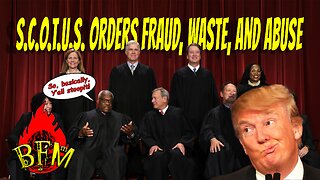Premium Only Content

Firearms Friday
Self-defense is a lawful right to counter harm, even if it's normally a crime. It applies in violent crime cases, varying between federal and state laws. Using force to counter imminent death or harm is self-defense. Courts consider factors like provocation, threat type, retreat obligation, reasonable fear, and response reasonableness. States establish self-defense rules, determining allowable force. Imminent threats warrant force, even from words causing immediate fear. A scenario exemplifies justified force use in true danger.
Self-defense ends when threat does; retaliatory force isn't defense. Example: if an aggressor stops attacking and signals safety, victim's later force is retaliation, not defense. Law assesses reasonable fear of harm. A "reasonable person" standard gauges justified force from perceived danger. Bee incident shows reasonable fear justifying force. Perceived threat can justify defense, regardless of intent. Imperfect self-defense occurs with unreasonable fear, possibly reducing charges.
Unreasonable fear leads to imperfect defense claims. If a non-threatening gesture is wrongly seen as an attack, excessive response's self-defense claim might lessen charges. Provoking attack can lead to imperfect defense claims, reducing charges but not excusing actions. Defense must match threat's level. Deadly force counters deadly threats, but excess defeats claim. Laws vary on retreat duty; some maintain it, while "stand your ground" laws allow defense without retreat. "Castle doctrine" permits deadly force against home intruders in many states. Seek local legal advice for self-defense claims.
For more on castle doctrine, refer to FindLaw. When unsure, consult a local attorney. Self-defense is intricate; legal counsel simplifies matters. Find a skilled criminal defense attorney in your area for help.
-
 36:00
36:00
The Brushfire Mind
4 days agoSupreme Court Mandates $2 Billion in Wasteful Spending
110 -
 LIVE
LIVE
Timcast
55 minutes agoDemocrat Machine IMPLODING, Biden AUTOPEN Scandal & ActBlue's COLLPASE Signal END Of Deep State
8,199 watching -
 LIVE
LIVE
Bannons War Room
20 days agoWarRoom Live
22,795 watching -
![🔴[LIVE TRADING] Stock Market Crash News & Predictions || The MK Show](https://1a-1791.com/video/fwe2/34/s8/1/i/K/j/r/iKjry.0kob-small-The-MK-Show-Mar.-10th.jpg) LIVE
LIVE
Matt Kohrs
12 hours ago🔴[LIVE TRADING] Stock Market Crash News & Predictions || The MK Show
2,108 watching -
 45:55
45:55
BonginoReport
3 hours agoTulsi was Right: Christians Murdered in Syria (Ep.156) - 03/10/2025
62K96 -
 1:14:35
1:14:35
Dear America
11 hours agoIs Trump’s, JD Vance’s Life In DANGER? + Trudeau RESIGNS as Canada’s PM, Names Successor!
56.3K10 -
 LIVE
LIVE
Wendy Bell Radio
5 hours agoDemocrats Have Lost Their Minds
14,364 watching -
![CIA Documents Implicate The Soros’ As Ukraine War Criminals. Putin Agrees [EP 4467-8AM]](https://1a-1791.com/video/fwe1/b9/s8/1/g/A/g/r/gAgry.0kob-small-CIA-Documents-Implicate-The.jpg) LIVE
LIVE
The Pete Santilli Show
15 hours agoCIA Documents Implicate The Soros’ As Ukraine War Criminals. Putin Agrees [EP 4467-8AM]
1,572 watching -
 1:55:20
1:55:20
TheDozenPodcast
20 hours agoPrison Officer EXPOSES deaths in custody: Sam Samworth
22.7K3 -
 25:23
25:23
Fit'n Fire
21 hours ago $0.59 earnedThe Krink at Home Part 2 - PSA 300 Blackout Krink vs PSA 5.56 Krink
28.3K4